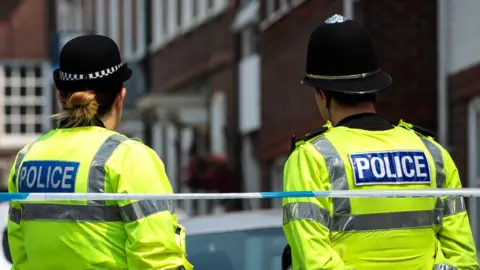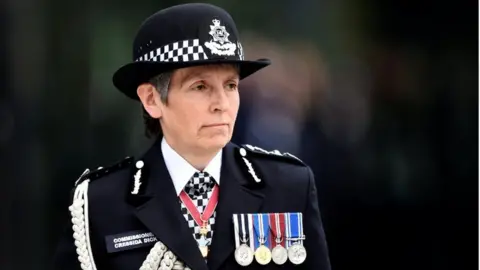Policing resources at dangerously low levels, ex Scotland Yard chiefs warn
 Getty Images
Getty ImagesBritish policing resources have been "drained to dangerously low levels", five ex-Met Police chiefs have warned.
The former commissioners, who ran London's police force from 1993 to 2017, said cuts had "contributed to the feeling of lawlessness" generated by knife crime and county lines drugs.
They called for a royal commission on policing and the possible ending of the "fragmented" system of 45 area forces.
The Home Office said it is increasing funds and working on a smarter system.
In a letter to The Times newspaper, the former Scotland Yard chiefs - and three other former senior officers - said there had been an "emasculation of British policing" in recent years.
They said the loss of more than 30,000 officers and support staff in recent years had left the public with "perilously low expectations".
The cuts, along with the "virtual destruction" of neighbourhood policing and the "undermining" of powers - such as stop and search, had taken their toll, they said.
The retired officers said the next prime minister will "inherit the urgent task of restoring confidence".
But they did not believe it could be restored by what they describe as a "fragmented" system of territorial forces.
Labour MP Yvette Cooper, who chairs of the home affairs select committee, said the "damning" letter revealed a "desperate need for more police".
In their letter, the retired officers call for a royal commission - essentially a government-appointed advisory committee - to investigate the state of British policing.
Sir Mark Rowley, who signed the letter and was assistant commissioner in Metropolitan Police between 2011-18, said: "We're saying it needs a fresh look at a national level in terms of how to organise policing to deal with the threats of today."
The letter criticised police and crime commissioners, saying they did not have the skills or resources to address the problems.
Sir Mark told BBC Radio 4's Today programme: "Having one person overseeing a massive organisation, there's no base in governance for that. You don't have boards of companies which is just one person on their own."
He said such commissioners had "fairly unchecked powers" in how they seek to direct the police.

Who signed the letter?
Metropolitan Police commissioners
- Lord Condon (1993-2000)
- Lord Stevens of Kirkwhelpington (2000-05)
- Lord Blair of Boughton (2005-08)
- Sir Paul Stephenson (2009-11)
- Lord Hogan-Howe (2011-17)
Other senior officers
- Sir Keith Povey, HM chief inspector of constabulary (2002-05)
- Sir Hugh Orde, president, Association of Chief Police Officers (2009-16)
- Sir Mark Rowley, assistant commissioner specialist operations, Metropolitan Police (2011-18)

The rebuke comes after the chief inspector of constabulary warned public safety could be at risk unless urgent reforms are made.
In his annual assessment of policing in England and Wales, Sir Thomas Winsor said there had been a 19% drop in police funding since 2010-11.
"There are indications that some forces are straining under significant pressure as they try to meet growing complex and high-risk demand with weakened resources," he said.
Sir Thomas called on politicians, police and crime commissioners and chief constables to "make bold, long-term decisions".
His proposals to improve policing included "considerable investment in technology to keep up with and get ahead of emerging online offending".
Prime Minister Theresa May was home secretary from 2010 to 2016 and in charge of managing police service budgets.
Between September 2009 and September 2017, police forces in England and Wales lost more than 20,000 officers - a drop of 15%. Numbers of officers consistently fell during that period.
 Reuters
ReutersLast week, the current Met Police Commissioner, Cressida Dick, said too many crimes are being left unsolved.
During a speech about the future of policing in England and Wales, she admitted that national detection rates for some offences were "woefully low".
She added: "The courts are emptying, not filling. It is not good and I am not proud of it."

What do the Tory leadership contenders say?
On Thursday, Boris Johnson promised to recruit 20,000 more police officers over three years in order to help with "rounding up the leaders of the county lines drugs gangs" and help with "proper stop and search".
Last month, his rival, Jeremy Hunt, said he thought the reduction in police numbers "went too far" and committed to increasing police numbers if he becomes prime minister.
He did not give precise figures, saying "work needs to be done."
